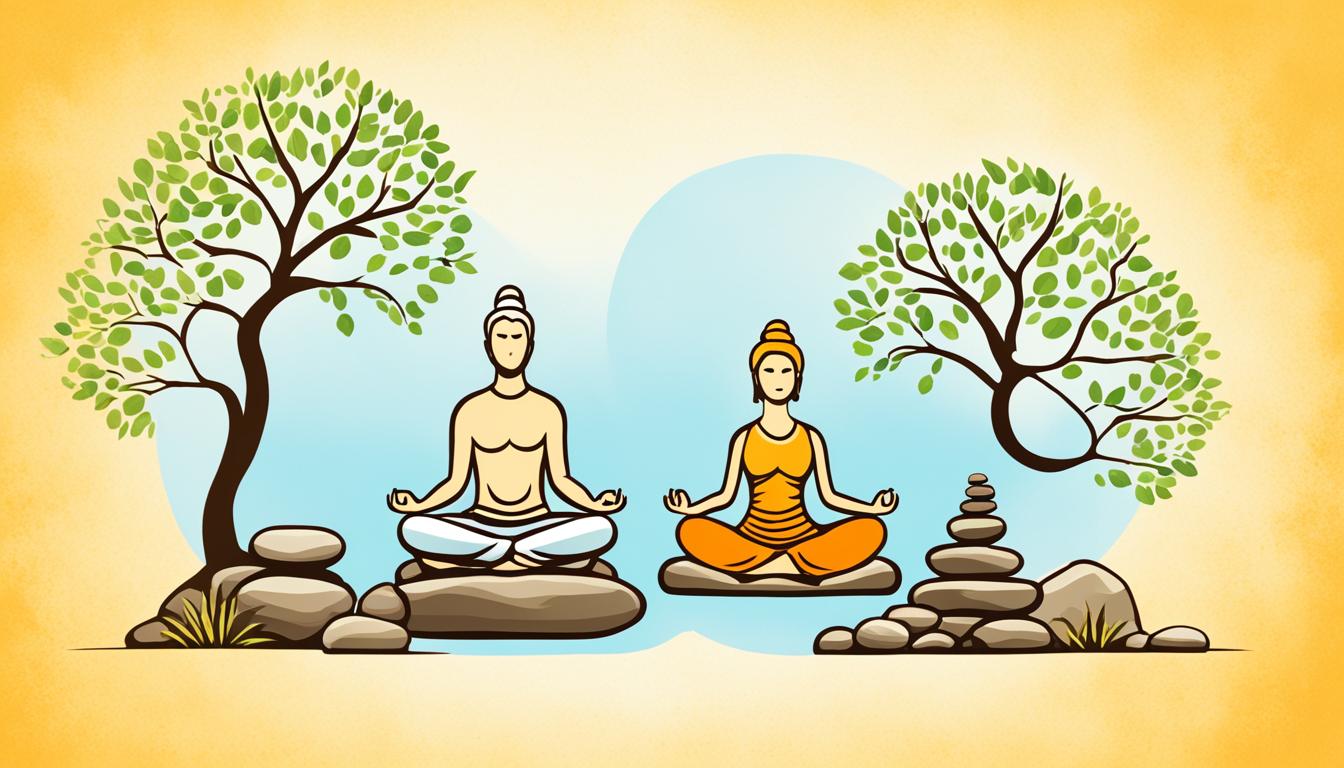Welcome to the world of stoic meditation, a practice deeply rooted in the principles of the Stoicism philosophy. In this fast-paced and chaotic world, finding inner peace and cultivating wisdom can seem challenging. Fortunately, stoic meditation offers a path to achieve these goals by incorporating mindfulness practices, self-reflection, and cognitive reframing techniques into your daily routine.
By embracing stoic meditation, you can develop mental resilience, emotional balance, and a greater sense of self-awareness. This practice encourages you to turn inward and examine your thoughts, actions, and attitudes, leading to a deeper understanding of yourself and your reactions to external events. Stoic meditation can equip you with practical wisdom to navigate the challenges of everyday life, promoting acceptance, moral virtue, and resilience.
Engaging in meditative exercises and daily mindfulness routines can significantly enhance your overall well-being. By incorporating stoic meditation into your life, you can experience the benefits of increased self-awareness, improved emotional regulation, and a greater sense of inner peace. Stoic meditation serves as an introduction to the stoicism philosophy, emphasizing living in accordance with nature and developing inner strength and resilience. It aligns with the principles of the Serenity Prayer, which emphasizes acceptance, courage, and wisdom.
Key Takeaways:
- Stoic meditation is a practice rooted in the principles of Stoicism philosophy.
- It focuses on cultivating mindfulness, building mental resilience, and fostering emotional balance.
- Self-reflection and the application of stoic principles contribute to inner peace and wisdom.
- Stoic meditation offers practical advice for resilience, acceptance, and the cultivation of moral virtue.
- The practice guides individuals to live in accordance with nature, developing inner strength and resilience.
The Power of Inner Reflection
Stoic meditation encourages individuals to turn inward and examine their thoughts, actions, and attitudes. Through the practice of self-reflection and mindfulness, you can gain a deeper understanding of yourself and your reactions to external events. This introspection contributes to the development of mental resilience and emotional balance.
When you engage in stoic meditation, you create a space for quiet contemplation and self-awareness. By observing your thoughts and emotions without judgment, you can uncover patterns and beliefs that may be driving your behavior. This process of self-reflection allows you to identify areas for growth and make conscious choices in alignment with your values.
Through regular mindfulness practice, you become more attuned to your present moment experience. You learn to observe your thoughts and emotions as they arise, without getting caught up in them. This heightened awareness enables you to respond to challenging situations with greater clarity and composure, rather than reacting impulsively.
Stoic meditation also helps cultivate mental resilience. By examining your thoughts and challenging unhelpful beliefs, you can reframe negative narratives and develop a more positive and empowering mindset. This shift in perspective allows you to navigate obstacles and setbacks with greater resilience, bouncing back from adversity and maintaining a sense of inner strength.
“The practice of stoic meditation provides a powerful tool for self-awareness and personal growth. By looking inward and reflecting on your thoughts and actions, you can cultivate a greater sense of emotional balance and mental resilience.”
Ultimately, stoic meditation offers a pathway to emotional balance and inner peace. As you develop a deeper understanding of yourself and your reactions, you are better equipped to regulate your emotions and navigate life’s challenges with grace and wisdom. By incorporating self-reflection and mindfulness into your daily routine, you can cultivate a lasting sense of well-being and resilience.

Practical Wisdom for Everyday Life
Stoic meditation goes beyond theory and offers practical advice that can be applied to navigate the challenges of everyday life. Through this ancient practice, individuals gain valuable insights into resilience, acceptance, and the cultivation of moral virtue, ultimately leading to a greater sense of inner peace and fulfillment.
Resilience is a key focal point of stoic meditation. By embracing the stoic principles of perseverance and adaptability, you can build mental and emotional resilience, allowing you to withstand life’s inevitable setbacks and challenges. Stoic meditation teaches you to view difficulties as opportunities for growth and to find strength in adversity.
Acceptance is another crucial aspect addressed through stoic meditation. By practicing acceptance, you learn to let go of things beyond your control and focus your energy on what you can change. This acceptance allows you to find peace amidst chaos and develop a more balanced perspective on life’s ups and downs.
Moral virtue is an integral part of stoicism, and stoic meditation provides guidance on cultivating moral excellence in your actions and thoughts. Through self-reflection and introspection, you can align your behavior with the principles of stoicism, fostering a greater sense of integrity, compassion, and ethical conduct.
By incorporating these practical principles into your daily life, you actively participate in your own personal growth journey. Stoic meditation offers you the tools to face challenges with resilience, embrace acceptance, and lead a life guided by moral virtue.

Embracing stoic meditation and applying its practical wisdom can lead to profound transformations in how you navigate life’s complexities. The journey towards inner peace, resilience, acceptance, and moral virtue awaits you.
Stoic Philosophy Unveiled
Stoic meditation serves as an introduction to Stoicism philosophy, which emphasizes living in accordance with nature and accepting the ups and downs of life. It provides a framework for developing inner strength and resilience through the practice of stoic principles.
Stoicism philosophy encourages individuals to align their thoughts, actions, and emotions with the rhythms of the natural world. By living in accordance with nature, you can cultivate a deeper understanding of yourself and the world around you.
Through stoic meditation, you can develop the inner strength to face life’s challenges with grace and resilience. By accepting that some things are beyond your control, you can focus on the aspects of life that you can influence and improve.
Stoic principles teach you to embrace adversity as an opportunity for growth and self-improvement. By reframing setbacks and obstacles as valuable lessons, you can foster a mindset of learning and personal development.

Stoic meditation also emphasizes the importance of cultivating resilience in the face of adversity. By developing a calm and composed inner state, you can navigate life’s challenges with fortitude and courage.
The practice of stoic meditation can benefit all areas of your life, from relationships and career to personal well-being. It offers a path to inner strength, resilience, and a sense of peace amidst the chaos of the world.
“The stoic philosophy teaches us to live in harmony with nature and accept the things we cannot change. By embracing stoic principles through meditation, we can cultivate inner strength and resilience.” – Marcus Aurelius
The Serenity Prayer and Stoicism
The Serenity Prayer, with its focus on acceptance, courage, and wisdom, perfectly aligns with the principles of Stoicism. It emphasizes the importance of accepting the things we cannot change, finding the courage to change what we can, and cultivating wisdom to know the difference.
Stoic meditation, with its emphasis on self-reflection and mindfulness practice, can be a valuable tool in implementing these principles in our daily lives. By practicing stoic meditation, we can develop the serenity to accept what is beyond our control, the courage to take action where we can make a difference, and the wisdom to discern between the two.

By integrating the Serenity Prayer with stoic meditation, we can cultivate a mindset that embraces these Stoic principles. This combination of acceptance, courage, and wisdom allows us to navigate life’s challenges with a greater sense of serenity and resilience.
The Benefits of Stoic Meditation
Stoic meditation offers numerous benefits for your mental well-being and emotional balance. By incorporating stoic meditation into your daily routine, you can experience increased resilience, improved emotional regulation, and a greater sense of inner peace.
One of the key benefits of stoic meditation is its ability to enhance self-awareness. Through the practice of mindfulness and self-reflection, you gain a deeper understanding of your thoughts, emotions, and reactions. This heightened self-awareness allows you to navigate life’s challenges with clarity and a greater sense of control.
In addition to self-awareness, stoic meditation promotes personal growth. By engaging in regular stoic meditation practices, you cultivate a mindset of continuous improvement and self-reflection. This commitment to personal growth allows you to develop your strengths, overcome limitations, and evolve into the best version of yourself.
Furthermore, stoic meditation fosters a mindful approach to life. By grounding yourself in the present moment and paying attention to your thoughts and sensations, you cultivate a sense of presence and deep connection with the world around you. This mindfulness practice enables you to fully engage in each moment and find beauty and gratitude in the simplest of things.
“Stoic meditation is a powerful tool for cultivating mental well-being, emotional balance, and personal growth. It empowers you to become more self-aware, resilient, and mindful, leading to a greater sense of inner peace.”
Through stoic meditation, you develop the capacity to navigate life’s challenges with grace and equanimity. It provides you with the tools to regulate your emotions, reframe negative thoughts, and approach difficulties with a calm and rational mindset. As a result, you experience a profound sense of emotional balance and resilience.
In summary, stoic meditation is a transformative practice that offers a multitude of benefits for your mental and emotional well-being. By incorporating this practice into your daily routine, you can enhance self-awareness, promote personal growth, and cultivate a mindful approach to life. Embrace the power of stoic meditation and unlock the potential for inner peace, wisdom, and personal growth.

How to Practice Stoic Meditation
Practicing stoic meditation involves a variety of techniques and exercises that can help individuals cultivate a deeper understanding of stoic principles and reap the desired benefits. To incorporate stoic meditation into your daily routine, consider the following practices:
Mindfulness Exercises
Engage in mindfulness exercises that allow you to focus your attention on the present moment. This can include activities such as mindful breathing, body scans, or sensory awareness exercises. By staying fully present and aware, you can develop a greater sense of clarity, calmness, and mental resilience.
Cognitive Reframing
Practice cognitive reframing to shift your perspective and thoughts towards a more stoic mindset. When faced with challenges or setbacks, consciously reframe your thoughts to focus on what you can control, rather than dwelling on things outside your influence. This allows you to cultivate a sense of acceptance, resilience, and inner strength in the face of adversity.
“The happiness of your life depends upon the quality of your thoughts.” – Marcus Aurelius
Sefl-Reflection
Make time for self-reflection on a regular basis. Set aside moments of solitude where you can contemplate your actions, thoughts, and emotions. Journaling can be a helpful tool for self-reflection, allowing you to explore your values, beliefs, and areas for personal growth. By gaining insight into yourself, you can make intentional choices aligned with stoic principles.
Daily Routine
Integrate stoic meditation into your daily routine to establish a consistent practice. Set aside specific times dedicated to your mindfulness exercises, cognitive reframing, and self-reflection. This regularity helps reinforce the habits and benefits of stoic meditation, allowing you to build resilience and wisdom over time.
By engaging in these practices, you can embrace stoic meditation and unlock its transformative power in your life. Remember, stoic meditation is a journey of personal growth and self-discovery, so be patient and kind to yourself as you explore the depths of this ancient practice.

Conclusion
Stoic meditation unlocks the transformative power of stoicism philosophy and mindfulness practice, offering a pathway to inner peace and personal growth. By incorporating the principles and techniques of stoic meditation into your daily life, you can cultivate a greater sense of wisdom and resilience while enhancing your overall well-being.
Through self-reflection and the application of stoic principles, stoic meditation fosters a deep understanding of oneself, leading to emotional balance and mental resilience. By turning inward and examining your thoughts, actions, and attitudes, you can navigate the challenges of everyday life with practical wisdom, acceptance, and moral virtue.
By embracing stoic meditation as part of your daily routine, you can experience the benefits of enhanced self-awareness, personal growth, and a mindful approach to life. This practice promotes a more fulfilling and meaningful existence, allowing you to live in accordance with nature and find inner peace amidst the ups and downs of life.
So, unleash the power of stoic meditation and embark on a journey of self-discovery and transformation. Embrace the stoicism philosophy and mindfulness practice to unlock your inner peace, foster personal growth, and cultivate a resilient mindset. Start your daily stoic meditation routine today and experience the profound and lasting effects it can have on your life.
FAQ
What is stoic meditation?
Stoic meditation is a practice rooted in the principles of Stoicism philosophy. It focuses on cultivating mindfulness, building mental resilience, and fostering emotional balance through self-reflection and the application of stoic principles.
How does stoic meditation contribute to mental resilience and emotional balance?
Stoic meditation encourages individuals to turn inward and examine their thoughts, actions, and attitudes. Through the practice of self-reflection and mindfulness, individuals can gain a deeper understanding of themselves and their reactions to external events, contributing to the development of mental resilience and emotional balance.
What practical wisdom does stoic meditation offer for everyday life?
Stoic meditation provides practical advice on how to navigate the challenges of everyday life. It offers insights into resilience, acceptance, and the cultivation of moral virtue. By applying these principles in daily life, individuals can develop a greater sense of inner peace and fulfillment.
What is the relationship between stoic meditation and stoic philosophy?
Stoic meditation serves as an introduction to Stoicism philosophy, which emphasizes living in accordance with nature and accepting the ups and downs of life. It provides a framework for developing inner strength and resilience through the practice of stoic principles.
How does the Serenity Prayer relate to stoic meditation?
The Serenity Prayer, with its focus on acceptance, courage, and wisdom, aligns with the principles of Stoicism. Stoic meditation can be a valuable tool in implementing these principles in our daily lives. It emphasizes accepting the things we cannot change, finding the courage to change what we can, and cultivating wisdom to know the difference.
What are the benefits of stoic meditation?
Stoic meditation offers numerous benefits for mental well-being and emotional balance. It enhances self-awareness, promotes personal growth, and cultivates a mindful approach to life. By incorporating stoic meditation into a daily routine, individuals can experience increased resilience, improved emotional regulation, and a greater sense of inner peace.
How can I practice stoic meditation?
Practicing stoic meditation involves various techniques and exercises including mindfulness practices, cognitive reframing, and self-reflection exercises. Engaging in these practices on a daily basis can help individuals develop a deeper understanding of stoic principles and cultivate the desired benefits.
What are the key takeaways of stoic meditation?
Stoic meditation offers a pathway to inner peace and personal growth through the application of stoicism philosophy and mindfulness practice. By incorporating the principles and techniques of stoic meditation into daily life, individuals can enhance their overall well-being and develop a greater sense of wisdom and resilience.
Source Links
- https://www.linkedin.com/pulse/power-control-stoic-perspective-inner-peace-gary-williams-4nf3e
- https://medium.com/@dailybookquotes/unlocking-inner-peace-and-wisdom-meditations-by-marcus-aurelius-a43019e1f8f1
- https://www.linkedin.com/pulse/serenity-prayer-stoic-path-inner-peace-empowerment-gary-williams


